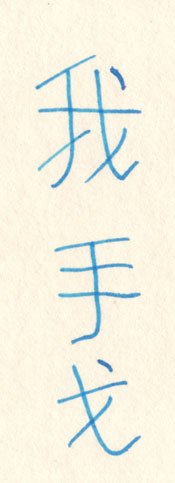hand holding halberd…

Continuing my, possibly reckless, exploration into Chinese, I want to discuss the character for the singular pronoun (I, me) wǒ which is the first character shown. Now this is composed of two elements: the one on the left, the 2nd shown, is a pictograph for ‘hand’; the one on the right is a pictograph for ‘halberd’ or ‘lance’. So wǒ is written as a hand holding a halberd…
This seems to me to pose two interesting questions. The first: in what kind of time did this character originate that when anyone, male or female or child, should represent themselves in any text, that they must do so as being armed? The second: what does this indicate about how a modern, literate Chinese person might see himself/herself. Of course, most likely, they just use the character and don’t think about it at all.
I hasten to add that I’m not trying to imply anything here about some kind of inherent agressiveness, but perhaps that there may be some kind of tendency for a person to feel that he or she is a ‘warrior’. Having studied T’ai Chi for several years, I have some understanding of the spiritual values that may underlie this…
Finally, can it be entirely unrelated that one of the core ways that China seems to perceive herself, and thus projects herself to the outside world, is through martial arts…?
“I read somewhere that, apparently, a large part of Chinese culture is carried in the characters.” – it’s true; the fun part is that people copied things wrong back then, so that interpreters of ancient texts in successive dynasties might come out with durastically different conclusions based on which version they read themselves. Confusing, but it creates great dialogue.
With regards to cultural memory, I don’t think the Chinese were any more destructive than other cultures. You’re right to say characters are a huge part – but not just the way they’re formed, or how language changes, but also that the literary tradition is huge. You canonize texts from every dynasty. It makes it very mainstream in a sense, but that’s how we have texts left over from 2000+ years ago. The Qin emperor burned the books because he wanted to unify the first empire; prior to that, it was various states who had different writing systems, sizes for wheels, philosophies. In that sense, he did destroy a lot; there was also enough kept so that we have works now from the Warring states period. And in the end, it was practical to have the same wheel sizes for the roads.
It’s interesting that you use this character as an example. Since this character wasn’t used until very recently. I think it’s original meaning is the same. But Chinese didn’t refer to each other by “you” or “me”; either the pronoun was dropped, or usually because it was formal, you’d actually call the person’s title.
And hand and spear would kind of make sense – the Chinese empire emerged out of the warring states; when each dynasty collapsed, its warlords would cause 200-400 years of fighting.